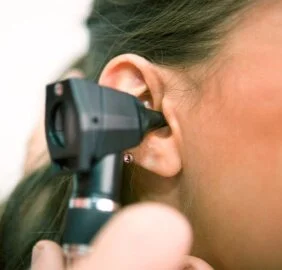Proper ear health is important. Taking care of your ears eliminates the chances of bacterial buildup and hearing loss. The ear is a complex network of organs designed to process sound and send it to the brain. But, they are also very delicate. If you aren't careful about accurately cleaning and listening to music at a safe volume, you risk infections or worse, hearing loss. Following these tips for practicing good ear health will help you manage and avoid auditory damages.
Don't Use Cotton Swabs
Earwax is designed to keep your ears healthy. There is no reason to remove the earwax unless advised by a professional. Sticking a cotton swab in your ear to remove build up is unnecessary and dangerous. It will push the ear wax further inside your ears and can poke your eardrum if you push it back far enough. If you need to remove excess earwax outside the ear, you can use a washcloth as there is little risk of anything getting pushed into your ear. Only let your trusted ENT clean your ears.
Keep a Healthy Diet
Over the years, diet has been found to play a critical role in maintaining ear health. You don't need to worry about eating particular types of food or consuming a specific number of calories. But, if you want to optimize your ear health and reduce the chances of early hearing loss, eat a balanced and nutrient-rich diet.
Minimize the Use of Pain Relievers
Using ibuprofen or aspirin for pain relief is not good for your ear health if taken every day. These medications can be rough and cause temporary or permanent hearing loss. Using pain relievers to aid when you have fever, body, or headaches is fine, but using them every day could be problematic. If you have questions about taking aspirin or ibuprofen, consult your ENT to discuss health and wellness.
Dry Your Ears
Excess moisture from showering, bathing, or swimming can cause bacterial buildup. What you can end up with is an ear infection. Keep your ears free from fluids by tilting your head to one side to ease the water out. After washing, you can use your towel to remove any excess moisture from around your ears gently.
Stop Smoking
For decades we've been receiving information about the dangers of smoking. We can now include ear health as an additional problem with smoking cigarettes. The chemicals found in the tobacco can affect the way your ears process sound. In some studies, smokers have been shown to have a 15% higher chance of suffering from hearing loss than those of non-smokers.
Turn Down the Volume on Your Personal Headphones
The World Health Organization estimates that 1.1 billion people between the ages of 12 - 35 are at risk of hearing loss due to exposure to recreational noise such as high volume from headphones. If you're going to listen to music, try to keep it at 60% of the full volume or less. Over the ear headphones are better than in ear. Earbuds can put a lot of pressure on the eardrum.
Give Your Ears a Break
It's important to give your ears time to recover if you are routinely exposed to loud noises throughout the day. Nashville is home to many aspiring musical artists, and there is often a requirement to listen to music at a high volume for an extended period. If you work in a bar or music venue, it's advisable to give your ears a 5-minute break as often as possible. Some researchers have suggested 16 hours of quiet to recover from a loud night out.
Custom Earplugs and Hearing Protection
Musicians, professional athletes, and industrial workers are susceptible to premature hearing loss and tinnitus. Custom earplugs provide maximum comfort, fit, and use the latest technologies for safe listening. They give the wearer an opportunity to preserve the integrity of their ear health without compromising on sound quality. Custom earplugs suppress sounds to keep the decibels within a safe listening range.
Everyone's ear canal is shaped differently. With custom earplugs, each earplug is molded to the ear to provide a safe and secure fit. You can choose from a variety of materials and technology to customize your experience. For more information about ear health and protecting your hearing, contact the experts at OAT today.


